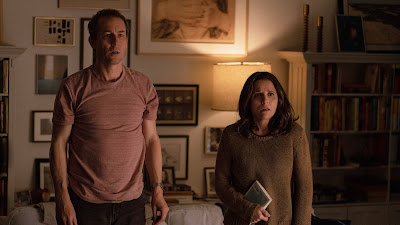“You Hurt My Feelings” opens with a married couple (Amber Tamblyn and David Cross) telling each brutal truths on a therapy couch, a recurring scene that slyly, if not impudently, equates such straight-forwardness with being stuck in a neutral, quietly laying the groundwork for a movie that repeatedly shifts the ground beneath us and its characters, like novelist Beth (Julia Louis-Dreyfus). Mirroring her own agent (LaTanya Richardson Jackson), who deems Beth’s new book-in-progress as good in that way you’re trying to communicate between the lines that good is not good enough, Beth inadvertently overhears her husband Don (Tobias Menzies), none the wiser, confess to his friend that he doesn’t like his wife’s new manuscript and can’t bring himself to tell her. If initially Holofcener paints their marriage as so unified they share an ice cream cone, much to the bemused semi-horror of their son Elliott (Owen Teague), Don’s unwitting revelation strains their union and puts the notion of what a supportive spouse means under the microscope.
Holofcener structures “You Hurt My Feelings” as collection of scenes that in one way or another all involve some measure of truth or equivocation. If Beth is undone by Don’s false cheerleading, Elliott accuses her of the same thing, her deeming his own aspirant writing as good work-unread, enrolling him in an advanced swimming course as a kid when he was average at best, all which Louis-Dreyfus has her character comically take in as someone oblivious to life’s patterns. If this has weighed down Elliott, then years of anniversary gifts between Beth and Don, meanwhile, become a hysterical emblem of the ballast of deliberate false niceties. Beth’s sister Sarah (Michaela Watkins), on the other hand, admits that she doesn’t always think her stage acting husband Mark (Arian Moayed) is good but never tells him. And though this concession would seem to portend her untruths being uncovered, they never are, a telling detail evoking not so much a marital foundation of lies as white lies helping reinforce that foundation. This is where the movie exists, as a kind of two-step dance, circling around into infinity.
Though Beth is a writer, we never see her writing, just as we almost never see Mark acting, and do not see him preparing to act, which is less an oversight than a deliberate choice, essentially the inverse of Kelly Reichardt’s recent “Showing Up.” There, despite all that was swirling around the main character, the process of creating art proved enough, whereas in “You Hurt My Feelings,” it’s the validation both Beth and Mark crave, art as means to an end rather than in and of itself, a marked difference between a passion and a career. Indeed, Don’s career as a therapist comes across middling, mixing up patients in the middle of treating them, Cross and Tamblyn’s argumentative couple humorously demanding restitution for his failure to help, while Sarah’s job as an interior designer is shown via recurring scenes where a client keeps nixing her proposed light fixtures. The payoff brings Sarah no pleasure, evocative of a movie in which professional and emotional satisfaction are not intertwined, and the notion of success is remains open to debate.
It just so happens that a couple years back a friend began a periodic Nicole Holofcener retrospective, in which I took part for a couple of viewings, including the writer and director’s 1996 debut “Walking and Talking” when her characters were in their thirties and just beginning the transition into their true adult lives. There is something as comforting as there is terrifying in catching back up with different versions of them nearly 30 years later to discover that they come so far and learned so little, still grasping at the vagaries of life, the gap feeling small and wide at once. Past white lies acknowledged in “You Hurt My Feelings” only seem to give way to new ones as the movie ends, a conclusion that sneaks up on you. Not unlike middle age, come to think of it, not unlike middle age has done to me, middle-aged white man reviewing this movie, and “You Hurt My Feelings” left me wracked with unexpected emotion not least for how it doesn’t really end at all, proffering one more question that it pointedly leaves unresolved, boldly, in its easygoing kind of way, not pretending to have all the answers.





No comments:
Post a Comment